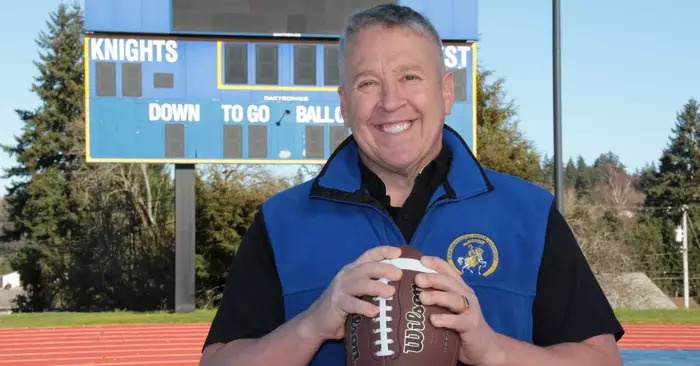
BY : Michael Foust Crosswalk Headlines Contributor
To this day, Coach Joe Kennedy looks back with bewilderment that a simple 30-second post-game prayer sparked a cultural battle and, ultimately, a Supreme Court case. Kennedy won that case, and he also won over many critics. He also inspired countless Christians around the world. Still, Kennedy is amazed that his defiant act—he prayed after being told to stop—changed America’s legal landscape.
“This was such a simple thing,” Kennedy told Crosswalk Headlines. “[Prayer has] been going on from the beginning of time.”
He had no interest in stirring controversy, he said, “but God had other plans.”
On Oct. 11, a movie about Kennedy’s legal fight—Average Joe—hits theaters. It’s based on a book of the same name and describes Kennedy as a man of conviction whose time in foster care and two decades in the Marines prepared him for the legal fight, which ultimately cost him his job as an assistant coach for the Bremerton (Wash.) High School football team.
Contrary to conventional wisdom, Kennedy had plenty of support from the community, not only among parents but also within the team. His detractors, though, were vocal — and powerful.
Kennedy began his coaching career after watching the 2006 faith-based football movie Facing the Giants by filmmakers Alex and Stephen Kendrick. That movie also spurred him to pray. From that moment, he made a “covenant with God” to “give Him the glory after every game, win or lose.
“It was maybe a 30-second prayer after each game that we played, home and away. It went on for eight years,” Kennedy said of his post-game prayer at the 50-yard line. “The kids wanted to know if they could come out [and join]. And of course, I told them it was a free country — and sometimes they did, sometimes they didn’t [pray].”
Soon, players from other teams joined the prayer, turning Kennedy’s somewhat inconspicuous act into a group event. Moved by this display of faith and unity, an individual from another school district contacted Kennedy’s principal.
“Everything started as a compliment,” Kennedy said.
That correspondence triggered a thorough review by attorneys, who became concerned that he was violating a policy prohibiting staff from encouraging or discouraging prayer. Initially, the attorneys and administrators instructed Kennedy to cease praying with the players. Kennedy complied with their directive and resumed praying on his own.
“Then somebody else raised a stink about it,” he said. “The lawyers thought better if I just completely stopped the prayer altogether and wanted me to go move somewhere else and pray where people couldn’t see me.”
Kennedy continued to pray on the football field. Eventually, he was fired. The controversy sparked friction in the home.
“My wife was the human resource director for the school district, so you can imagine she was in the middle of all this, and she was getting it from both sides,” Kennedy said. “She was left all alone, on an island, all by herself, and we almost got divorced over this.”
An act of kindness from the Kendrick brothers helped save their marriage.
“We were ready to split up,” Kennedy said. “I was getting ready to walk out the door and got a video from the Kendrick brothers. [They were] standing on the 50-yard line where they filmed Facing the Giants, and he said, ‘Coach, I know you and your wife are going through some hard times right now, and I just want to encourage you.’
“We ended up sitting there watching the video,” he added. “We just cried in each other’s arms for about an hour. …Instantly, we were healed, where two became one, and it was just an amazing miracle right at the perfect second. …I don’t even know how they got my number.”
Kennedy sued the school district, losing in the district court and the appeals court. He won at the U.S. Supreme Court in a 2022 landmark case that ruled the school district’s actions had violated his religious liberty and free speech rights. The decision also overturned the so-called Lemon Test, a legal doctrine that had been used by courts since 1971 on religious cases and often had been cited to restrict religious liberty.
Kennedy wants his story and the movie Average Joe to inspire others.
“God has something to say to the rest of the world, and Americans [need] to wake up and understand what their First Amendment means and their freedom of speech, the freedom of religion, and the free exercise [of religion],” he said. “If we don’t exercise those, then we end up losing them.
“You have more religious liberty and freedoms today than we’ve had in the past 50 years.”
Kennedy no longer coaches at the high school. Instead, he travels around the country and encourages others to “stand up for what is right and do the right thing.”
“Life is not a bed of roses. It’s going to be hard, and it’s going to have rough times,” he said.
His story, he said, is that average people can make a lasting difference.
“If this guy could change the nation with this — with a simple act of faith — imagine what we could do as a country,” he said, referencing himself. “So I hope people walk away inspired and ready to stand up and fight and be bold in their faith, and be bold as Americans.”
Photo Credit: ©Fathom















